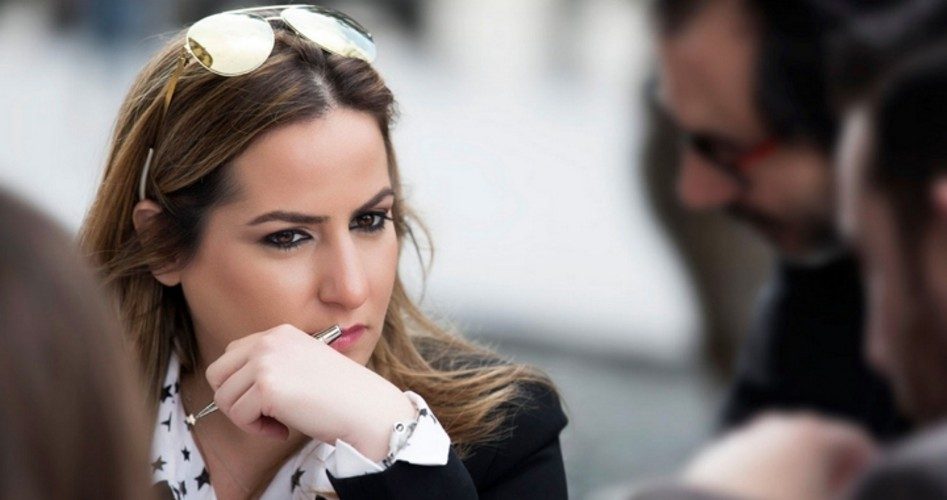
The United Nations “Special Tribunal for Lebanon” (STL) was ostensibly set up to find and bring to justice the killers of Lebanese Prime Minister Rafiq Hariri, who was murdered a decade ago along with more than 20 others in a massive bomb explosion. But rather than fulfilling its mandate after squandering some $500 million tax dollars, the UN court is seeking to put journalist Karma Khayat (shown) in prison for seven years — not for killing the late Lebanese leader, but for her groundbreaking reporting on the case that exposed the court’s stunning incompetence. The Hague-based UN outfit is also demanding that Khayat’s media outlet, Beirut-based TV news station Al-Jadeed, hand over up to $7 million in “fines.”
In closing statements on June 19 and in an interview with The New American later in the day, Khayat lambasted the UN court and what she said was its outrageous assault on fundamental human rights. “This is a case against freedom of speech and the free press,” she told The New American from Holland after the last day of the trial. “It’s definitely illegitimate to prosecute journalists. The tribunal’s role was to find those who assassinated our prime minister. It should not be used against journalists. We have enough dictators in the Arab region, and we certainly don’t need this.” A “verdict” on the case is expected in the coming months, she said.
{modulepos inner_text_ad}
The bizarre prosecution — or persecution, perhaps — of a journalist for engaging in journalism has raised major concerns around the world about the UN, its kangaroo court, and its draconian views on fundamental liberties such as freedom of the press. According to the tribunal, which charged Khayat with “contempt” and “obstruction of justice,” the reporter was wrong to broadcast information that she had learned about the ongoing proceedings. The investigative report in question, aired in August 2012, featured interviews with five alleged witnesses in the case. Their faces were blurred and no names or identities were revealed.
A spokesperson for Al Jadeed who spoke to The New American said the broadcaster was careful to conceal the identities of the individuals, but that it believed the information “was in the public interest” — especially to expose the fact that leaks were coming from within the system. The UN tribunal apparently disagreed and, styling itself the arbiter of what journalists may or may not report, became outraged. Eventually the court charged Khayat with allegedly “undermining public confidence in the Tribunal’s ability to protect the confidentiality of information about, or provided by, witnesses or potential witnesses” and of “violating the Order issued by the Pre-Trial Judge” purporting to prohibit the broadcasting of the report. The UN court also demanded that the reports be taken off the Internet.
If convicted, Khayat could face up to seven years in a UN prison at The Hague. She could also be fined more than $110,000. Broadcaster Al Jadeed, which describes itself as a secular, pro-democracy, pan-Arab media outlet, could face crippling fines running into the millions. The broader implications of the prosecution, of course, include a chilling effect on free speech and freedom of the press worldwide, with journalists apparently expected to obey the orders and decrees of UN “tribunals” widely viewed as illegitimate around the world.
The U.S. government is not a member of the UN International Criminal Court, yet the UN’s self-styled judicial regime purports to have the authority to target every human being on the planet for vaguely defined “crimes” — with none of the protections guaranteed in the U.S. Constitution. Already, the ICC, widely ridiculed by American legal scholars as a dangerous joke, claims to be “investigating” U.S. troops. Even some senior U.S. officials have claimed that the UN’s kangaroo courts could, theoretically, prosecute American presidents for violating what the UN and its apparatchiks like to describe as “international law.”
Speaking to The New American after the final session, Khayat sounded confident and upbeat. “We put up a very strong defense,” she explained, adding that the world was watching. “It seems that the embassies of several Western countries are interested in the case — they all attended the closing. This is quite weird, but I think it goes back to the reason that it’s the first time in the history of the tribunal that a company [Al Jadeed] has been prosecuted, and this could reflect negatively on the court. This is simply a case against freedom of speech.”
In her closing statements, meanwhile, the respected Lebanese journalist rebuked the UN tribunal, saying it had “most certainly failed to prove the charges” and that the case was “empty in content and form.” The prosecution “abused the truth,” added Khayat, who studied at the Lebanese American University and later received training at Harvard. “You have wasted money, resources, time and you have morally undermined the reputation of this tribunal,” she told the court in the final session. “Justice has much more important issues to look at.” She pointed to ongoing wars in the Middle East, ISIS rampages, and more before blasting the prosecutor for “wasting our time with an empty file.”
On a website dedicated to defending Khayat and freedom of the press, the implications of the case are also highlighted. “In STL Prosecutor vs. Karma Khayat and AL JADEED TV the basic role of the press is being questioned as well as the media’s right to freedom of speech,” it explains. “Just as serious is the fact this international body was created to avoid the political issues of security and freedom of speech a fully Lebanese tribunal would have faced. It is therefore surprising that this international body is using the same tools of intimidation by bringing forward this trial as those fundamental values are supposed to reject.”
The results of the UN court’s assault on free speech and press will be especially tragic for Lebanon. “This prosecution saps years of efforts and jeopardizes the future of the freedom of a more and more muzzled Lebanese press,” SpeakOutForKarma.com observes. Also at stake is the Lebanese people’s right to access information — and the right of all people to be informed about what their taxes are funding. That is especially important when dealing with international courts that purport to have vast powers over every human being on the planet.
Perhaps equally alarming is the prosecution of the broadcaster as a corporate entity — the first time in the history of “international jurisprudence” that an organization or corporate entity is prosecuted. If the court is successful in its attack on Al Jadeed, “international jurisprudence would then be able, through the law of precedence, to prosecute any organization or corporate entity.” That includes other media outlets worldwide. Any and all legitimate journalists, of course, are right to be concerned, especially as the UN continues to usurp more and more power.
On its website, the UN “court” posted a statement, in line with the UN’s Universal Declaration of [pseudo]-Human Rights, justifying its prosecution and claiming that freedom of speech and the press must be limited by the dictates of governments, dictators, and the UN. “The freedom of expression guarantees everyone’s right to hold opinions and expressions, receive and impart information and ideas as long as they are in accordance with the applicable laws” (emphasis added), it claims in an argument that flies in the face of the values Americans from across the political spectrum hold dear. “The freedom of expression is not absolute and journalists and media organizations must comply with the law.”
As The New American has documented extensively, the UN has an atrocious record when it comes to freedom of the press and free speech. Khayat’s prosecution is hardly the first assault by the outfit, widely ridiculed as the “dictators club,” on those fundamental liberties enshrined in the U.S. Constitution’s First Amendment. In fact, in 2011, French journalist Florence Hartmann, with the major newspaper Le Monde, was sought by another UN “court” for “contempt” in connection with her criticism of a decision it made to classify information. The reporter was spared only because French authorities refused to hand her over to the UN outfit. The UN has also continued to brazenly persecute whistleblowers, including, most recently, the senior official who exposed UN “peace” troops systematically raping young children in the Central African Republic.
With the UN increasingly behaving as if it were some sort of out-of-control world government, with unlimited authority to assault even the most basic of freedoms, it is past time for the U.S. government to permanently withdraw. The American Sovereignty Restoration Act of 2015 (H.R. 1205) would do precisely that, in addition to expelling the UN from U.S. soil. In the meantime, Congress could start by defunding the UN and all of its freedom-crushing tentacles. Journalists around the world should take the lead as one of their fellow reporters is threatened by the UN with prison for doing her job.
Photo: Karma Khayat
Alex Newman, a foreign correspondent for The New American, is normally based in Europe. Follow him on Twitter @ALEXNEWMAN_JOU. He can be reached at [email protected]
Related articles:
While Attacking Free Press, UN Touts “World Press Freedom Day”
UN Kangaroo Court Has U.S. Troops in Crosshairs
UN Seeks to Criminalize Free Speech, Citing “Human Rights”
After Ejecting Media, the UN’s WHO Approves Global Tobacco Tax Scheme
Embroiled in Scandal, UN Agency Boss Attacks Free Press
Chinese Communist to Lead UN Agency Seeking to Control Internet
Whistleblower Targeted for Exposing UN Troops Raping Children
United Nations Exploits Pseudo-“Human Rights” to Attack U.S.
UN Could Prosecute Bush for War Crimes, Says Ex-U.S. Terror Czar
CFR, Brookings Celebrate Obama “Lovefest” for International Criminal Court
UN “Court” Rules Liberian Tyrant & CIA Asset Charles Taylor Guilty
The United Nations: On the Brink of Becoming a World Government




